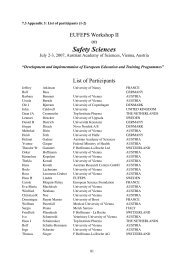2011 Anniversary Yearbook - EUFEPS today and history
2011 Anniversary Yearbook - EUFEPS today and history
2011 Anniversary Yearbook - EUFEPS today and history
Create successful ePaper yourself
Turn your PDF publications into a flip-book with our unique Google optimized e-Paper software.
<strong>EUFEPS</strong> Newsletter, 2001, vol. 10, issue 4<br />
<strong>EUFEPS</strong> 10 th anniversary<br />
European Federation<br />
for Pharmaceutical<br />
Sciences<br />
Dominique Duchêne, Professor<br />
<strong>EUFEPS</strong> President<br />
Ten years ago here in Strasbourg,<br />
<strong>EUFEPS</strong> was founded in the presence<br />
of Anders Björck, the President of the<br />
Parliamentary Assembly of the Council<br />
of Europe.<br />
This was the accomplishment of a<br />
challenge launched by 3 scientists, 3<br />
great Europeans: Stig Agurell, Douwe<br />
Breimer <strong>and</strong> Ernst Mutschler. They<br />
recognized the need for an independent<br />
European scientific body to promote the<br />
European pharmaceutical sciences at the<br />
highest international level, with a simple<br />
objective: to serve <strong>and</strong> advance excellence<br />
in pharmaceutical sciences <strong>and</strong> innovative<br />
drug research. In their task, they were<br />
strongly <strong>and</strong> financially supported by the<br />
Swedish Pharmaceutical Society.<br />
The scientific potential of Europe<br />
is known, but too often isolated <strong>and</strong> not<br />
well enough organized <strong>and</strong> co-ordinated.<br />
The task of <strong>EUFEPS</strong> is to contribute to<br />
the reversal of such a situation. This can<br />
be achieved by a fruitful international<br />
competition in which Europe has to<br />
participate as full partner, not for the<br />
egotistical contentment of scientists, but<br />
for the benefit of health.<br />
From the scientific st<strong>and</strong>point, as<br />
well as from the political one, Europe is<br />
characterized by its diversity. This is both<br />
a strength <strong>and</strong> a weakness. It is a strength,<br />
because diversity can generate scientific<br />
ideas in profusion. But it is a weakness,<br />
because it is energy- <strong>and</strong> time-consuming.<br />
<strong>EUFEPS</strong> has to co-ordinate this inherent<br />
diversity without destroying it. What can<br />
be done by <strong>EUFEPS</strong>?<br />
Members<br />
On Saturday 21 September 1991, 16<br />
societies representing 15 countries from<br />
all over Europe (north to south, east to<br />
west) constituted the founding members.<br />
The societies were from: Austria, Croatia,<br />
Czechoslovakia, Denmark, Finl<strong>and</strong>,<br />
France, Germany, Greece, Hungary, Italy,<br />
Pol<strong>and</strong>, Sweden, The Netherl<strong>and</strong>s, Turkey<br />
<strong>and</strong> the United Kingdom.<br />
Today, the number of our member<br />
societies has increased significantly to 25<br />
societies representing 23 countries <strong>and</strong><br />
approximately 25,000 members.<br />
The objective of <strong>EUFEPS</strong>, as a<br />
European federation, is to have member<br />
societies from all the European countries,<br />
<strong>and</strong> to represent all the pharmaceutical<br />
sciences. This is not easy to achieve, for<br />
several reasons:<br />
First, the reason why a scientific<br />
society should become member of<br />
<strong>EUFEPS</strong> is not clear to some of them, who<br />
wonder what could be their benefit from<br />
membership. In fact, there is no benefit,<br />
except the satisfaction of participating in a<br />
European task, for those who want. But, if<br />
they do, both scientists <strong>and</strong> the citizens of<br />
Europe will benefit.<br />
We are aware of the difficulties some<br />
European societies may have to pay<br />
their subscription whatever our effort<br />
in adapting the membership fees to the<br />
country <strong>and</strong> the number of members of<br />
the societies.<br />
It is also difficult to have member<br />
societies representing the different<br />
pharmaceutical sciences because of the<br />
great diversity of the European societies.<br />
Some are national pharmaceutical<br />
societies. They represent all the different<br />
aspects of pharmacy: community<br />
pharmacy, hospital, industry, academia,<br />
etc. Some other member societies represent<br />
a well-defined pharmaceutical science.<br />
To have fruitful collaborations with our<br />
member societies, we need to know<br />
precisely their best scientific domain.<br />
XXX<br />
Dominique Duchêne, Professor<br />
At the beginning of the year we sent<br />
them a questionnaire, a matrix in which<br />
appeared, on one side, the pharmaceutical<br />
disciplines (academic approach), <strong>and</strong>, on<br />
the other side, the processes (industrial<br />
approach). We asked our member societies<br />
to locate themselves on this matrix, but<br />
unfortunately, probably due to insufficient<br />
explanation from our part, the answers<br />
were not as precise as expected.<br />
Other European Organisations<br />
There also exist European federations of<br />
different pharmaceutical sciences, such as:<br />
EACPT (European Association of Clinical<br />
Pharmacology <strong>and</strong> Therapeutics), EFMC<br />
(European Federation for Medicinal<br />
Chemistry), Eurotox, ESBP (European<br />
Society of Biopharmacy), EFPIA<br />
(European Federation of Pharmaceutical<br />
Industry Associations), etc. with which<br />
we already have contacts. Some of them<br />
would like to co-operate closely with<br />
<strong>EUFEPS</strong>, <strong>and</strong> we have or are preparing<br />
letters of underst<strong>and</strong>ing. In the near future,<br />
we will probably be obliged to create a<br />
new type of membership to give them the<br />
possibility of becoming true members of<br />
<strong>EUFEPS</strong>.<br />
We also have individual members,<br />
approximately 500. With them, with the<br />
scientists recommended by our member<br />
societies, we expect to create a virtual<br />
school of excellence.<br />
Roles of <strong>EUFEPS</strong><br />
The different memberships of <strong>EUFEPS</strong><br />
should not represent a kind of private club<br />
for scientists, but a powerful group capable<br />
of serving <strong>and</strong> advancing excellence in<br />
pharmaceutical sciences <strong>and</strong> innovative<br />
drug research.<br />
One of the roles of <strong>EUFEPS</strong> is to<br />
encourage the organization of scientific




